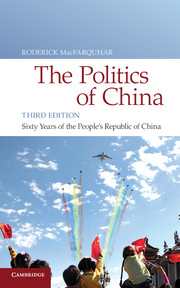Book contents
- Frontmatter
- Contents
- Tables and Maps
- Preface
- Abbreviations
- Introduction
- Chapter 1 The establishment and consolidation of the new regime, 1949–1957
- Chapter 2 The great leap forward and the split in the Yan'an leadership 1958–1965
- Chapter 3 The Chinese State in crisis, 1966–1969
- Chapter 4 The succession to Mao and the end of Maoism, 1969–1982
- Chapter 5 The road to Tiananmen: Chinese politics in the 1980s
- Chapter 6 Reaction, Resurgence, and Succession: Chinese Politics since Tiananmen
- Chapter 7 Dilemmas of globalization and governance
- Appendix Leaders and Meetings
- References
- Index
- References
Introduction
Published online by Cambridge University Press: 05 June 2012
- Frontmatter
- Contents
- Tables and Maps
- Preface
- Abbreviations
- Introduction
- Chapter 1 The establishment and consolidation of the new regime, 1949–1957
- Chapter 2 The great leap forward and the split in the Yan'an leadership 1958–1965
- Chapter 3 The Chinese State in crisis, 1966–1969
- Chapter 4 The succession to Mao and the end of Maoism, 1969–1982
- Chapter 5 The road to Tiananmen: Chinese politics in the 1980s
- Chapter 6 Reaction, Resurgence, and Succession: Chinese Politics since Tiananmen
- Chapter 7 Dilemmas of globalization and governance
- Appendix Leaders and Meetings
- References
- Index
- References
Summary
Sixty years is a long life-span for a revolutionary regime to survive and remain vigorous. The celebration in 2009 of the 60th anniversary of the Chinese communist conquest of power and the creation of the People's Republic of China (PRC) was in stark contrast to the fate of its erstwhile Soviet “elder brother.” Despite suffering terrible human tragedies and political upheavals – notably, the great famine of 1959–61 and the Cultural Revolution of 1966–76 – the PRC had emerged as a powerful and dynamic country. The purpose of this volume is to chronicle how that came about. The purpose of this introduction is to proffer a hypothesis, based on that chronicle, to explain the Chinese success.
- Type
- Chapter
- Information
- The Politics of ChinaSixty Years of The People's Republic of China, pp. 1 - 5Publisher: Cambridge University PressPrint publication year: 2011



